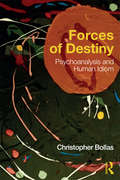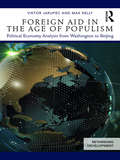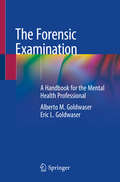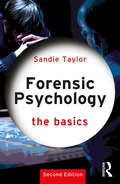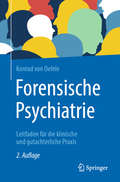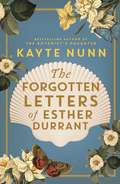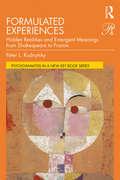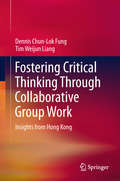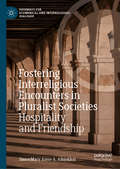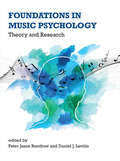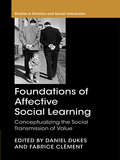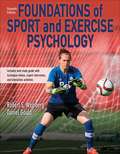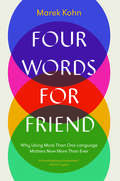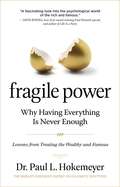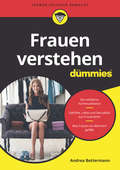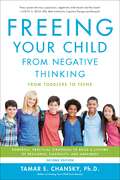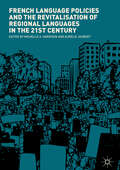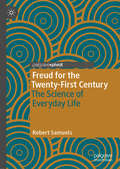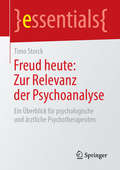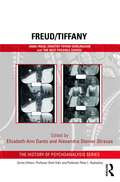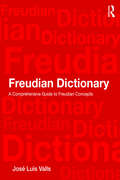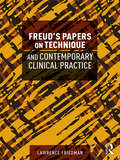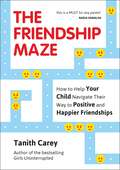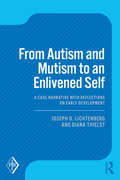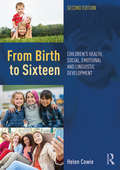- Table View
- List View
Forces of Destiny: Psychoanalysis and Human Idiom
by Christopher BollasChristopher Bollas is one of the most expressive and eloquent exponents of the ideas, meanings and experience of psychoanalysis currently writing. He has a real gift for taking the reader into the fine texture of the psychoanalytic process. Forces of Destiny examines and reflects on one of the most fundamental questions – what is it that is unique about us as individuals? How does it manifest itself in our personalities, our lives, relationships and in the psychoanalytic process? Drawing on classical notions of ‘fate’ and ‘destiny’ and Winnicott’s idea of the true self, Bollas develops the concept of ‘the human idiom’ to explore and show how we work out – both creatively and in the process of analysis – the ‘dialectics of difference’. In particular he reflects on how the patients may use particular parts of the psychoanalyst’s personality to express their own idiom and destiny drive. Forces of Destiny was Bollas’ second book. His first, The Shadow of the Object (1987), was described by the reviewer in the International Journal of Psycho-Analysis as a ‘unique and remarkable book. I think of it as one of the most interesting and important new books on psychoanalysis which I have read in the last decade.’ Forces of Destiny confirmed his position as one of the most important, thoughtful and engaging psychoanalytic writers. With a new preface from Christopher Bollas, Forces of Destiny remains a classic of psychoanalytic literature, appealing to psychoanalysts as well as readers in art history, literature, philosophy, and cultural studies.
Foreign Aid in the Age of Populism: Political Economy Analysis from Washington to Beijing (Rethinking Development)
by Viktor Jakupec Max KellyAcross the world the Western dominated international aid system is being challenged. The rise of right-wing populism, de-globalisation, the advance of illiberal democracy and the emergence of non-Western donors onto the international stage are cutting right to the heart of the entrenched neoliberal aid paradigm. Foreign Aid in the Age of Populism explores the impact of these challenges on development aid, arguing that there is a need to bring politics back into development aid; not just the politics of economics, but power relations internally in aid organisations, in recipient nations, and between donor and recipient. In particular, the book examines how aid agencies are using Political Economy Analysis (PEA) to inform their decision making and to push aid projects through, whilst failing to engage meaningfully with wider politics. The book provides an in-depth critical analysis of the Washington Consensus model of political economy analysis, contrasting it with the emerging Beijing Consensus, and suggesting that PEA has to be recast in order to accommodate new and emerging paradigms. A range of alternative theoretical frameworks are suggested, demonstrating how PEA could be used to provide a deeper and richer understanding of development aid interventions, and their impact and effectiveness. This book is perfect for students and researchers of development, global politics and international relations, as well as also being useful for practitioners and policy makers within government, development aid organisations, and global institutions.
The Forensic Examination: A Handbook for the Mental Health Professional
by Alberto M. Goldwaser Eric L. GoldwaserThis book prepares the mental health professional to use scientific skills when working within a legal framework. Written by a seasoned forensic psychiatrist with decades of experience and professional honors, this text answers some of the most challenging questions psychiatrists face when mental health intersects with the courtroom. The text is supported with 34 case vignettes that demonstrate ways in which seemingly simple diagnoses have unique layers of complexities that are vital within the legal system. The resource covers topics that may not be elucidated in medical schools, including what to expect from an expert witness, how to communicate with attorneys who lack a medical background, managing opposing viewpoints, psychiatric and medical malpractice, harassment, employment status, and other difficult topics as it pertains to the law. The text also knits this understanding of forensic psychiatry with clinical knowledge, addressing violence and risk assessment, discrimination, disability evaluation, psychiatric disorders, criminal and civil competence, end-of-life care and decisions, and a wide array of medical topics that have unique concerns when placed in the context of the legal system.The Forensic Examination is a vital resource for psychiatrists, psychologists, criminal and civil defenders, and all professionals working with persons in the medicolegal system.
Forensic Psychology: The Basics (The Basics)
by Sandie TaylorThis edition of Forensic Psychology: The Basics continues to provide an essential and accessible overview of a dynamic and fascinating discipline. Providing an engaging introduction to the core topics within Forensic Psychology, the text combines a discussion of theory with information about the role of a professional forensic psychologist. This edition has been fully updated throughout to include additional coverage of: Offender profiling and rehabilitation The role of psychology in crime prevention Psychological factors relating to terrorism Established topics including police psychology, the psychology of crime and delinquency, victimology and victim services, and correctional psychology are also considered in this invaluable guide. It will be essential reading for students across a range of disciplines, from psychology to criminology to law, or general readers seeking a concise and jargon-free introduction.
Forensische Psychiatrie: Leitfaden für die klinische und gutachterliche Praxis (Reihe Psychologie Ser. #41)
by Konrad von OefeleForensische Psychiatrie und Rechtswissenschaft, gesetzliche Bestimmungen und Rechtsprechung entwickeln sich ständig weiter. In den letzten Jahren wurden wesentliche Änderungen in den Bereichen Unterbringung, freiheitsentziehende sowie Behandlungsmaßnahmen unter Zwang vorgenommen. Der forensisch-psychiatrisch Tätige muss sich daher stets von neuem mit den Inhalten seines Fachgebietes auseinandersetzen und seine Kenntnisse auf dem neuesten Stand halten. Dieses Buch hält sich an allgemein akzeptierte Grundsätze und Standards der Forensischen Psychiatrie und wurde für die Neuauflage überarbeitet und aktualisiert. Es enthält eine fundierte und überschaubare Einführung ins Fachgebiet und bietet praktische Hilfe für Psychiater, die ihre Tätigkeit als Gutachter beginnen. Auch erfahrene Gutachter profitieren von der übersichtlichen Zusammenfassung der wichtigsten Grundlagen. Angehörige anderer Berufe mit Vorkenntnissen, z. B. Juristen, Sozialarbeiter und Psychologen, finden hier forensisch-psychiatrische Grundkenntnisse.
The Forgotten Letters of Esther Durrant: The new gripping and heartbreaking historical novel from the bestselling author of The Botanist's Daughter
by Kayte Nunn'I loved this exquisitely written novel and drank in every word. The Forgotten Letters of Esther Durrant is a reminder of the redemptive nature of love, and that it can be found in the most unexpected places.' Fiona Valpy, bestselling author of The Dressmaker's Gift and The Beekeeper's PromiseAn abandoned woman...1951. Esther Durrant, a young mother, is committed to an asylum by her husband. Run by a pioneering psychiatrist, the hospital is at first Esther's prison - but can captivity lead to freedom?A forbidden love...2018. When free-spirited marine scientist Rachel Parker is forced to take shelter on an isolated island off the Cornish Coast during a research posting, she discovers a collection of hidden love letters. Captivated by their passion and tenderness, Rachel is determined to find the intended recipient. A dangerous secret...Meanwhile, in London, Eve is helping her grandmother write her memoirs. When she is contacted by Rachel, it sets in motion a chain of events that threatens to reveal secrets kept buried for more than sixty years. Three women bound together by a heartbreaking secret. A love story that needs to be told.This beautifully haunting and atmospheric novel, will sweep fans of Kate Morton, Elizabeth Gilbert and Emily Gunnis away this summer.'If you enjoyed "City of Girls," by Elizabeth Gilbert, read "The Forgotten Letters of Esther Durrant," by Kayte Nunn' Washington PostNetGalley reviewers are falling in love with The Forgotten Letters of Esther Durrant:'Loved, loved this book. The multi layers wove an intriguing tale, and this was a well researched engaging and heart rending story.''Beautifully written''An absorbing tale set mainly in the Channel Islands. I wanted to know what the resolution would be, so stayed up to read to the end!'Praise for Katye Nunn's The Botanist's Daughter:'A sweeping and exotic read. I was completely swept away. Perfect for readers of Kate Morton.' Lorna Cook, bestselling author of 'The Forgotten Village''The whole book is a delight... Perfect reading whilst sipping a g & t in a beautiful garden somewhere in the sun!' Rosanna Ley, bestselling author of 'The Lemon Tree Hotel''I loved this book and really look forward to reading the next book by Kayte Nunn; perfect for reading in the garden with a glass of something cold.' Bookliterat'Fast-moving and full of surprises...while delivering a poignant and heart-warming story of romance and new beginnings ' Kate Forsyth'The Botanist's Daughter is a quick paced but mysterious read, which transports you across time and place and is filled with an abundance of flowers.' Foreword Books'The Botanist's Daughter is an intriguing story about the strength of women who, for their own reasons, are willing to travel halfway across the world and end up with the same goal. It's also a family mystery that slowly reveals its secrets, just like a blooming flower.' The Bookish Gurl 5/5 stars
Formulated Experiences: Hidden Realities and Emergent Meanings from Shakespeare to Fromm (Psychoanalysis in a New Key Book Series)
by Peter L. RudnytskyIn Formulated Experiences, Peter L. Rudnytsky continues his quest for a "re-vision" of psychoanalysis by coupling his revival of the unjustly neglected figure of Erich Fromm with his latest groundbreaking research on Ferenczi and Groddeck. Committed at once to a humanistic and to a literary psychoanalysis, Rudnytsky explores the subjective roots of creativity and critiques the authoritarianism that has been a tragic aspect of Freud’s legacy. Through his clinically informed interpretations he brings out both "hidden realities" and "emergent meanings" of the texts and authors he examines, including Shakespeare’s Othello and Macbeth, as well as Milton’s Paradise Lost. A preeminent scholar of the history and theory of psychoanalysis, Rudnytsky displays an interdisciplinary expertise that makes Formulated Experiences truly sui generis and unlike any existing book. Bridging the artificial divide between the academic and clinical worlds, his eloquent championing of the interpersonal and relational traditions will captivate contemporary psychoanalysts and psychotherapists, while his insightful close readings provide a model for psychoanalytic literary critics.
Fostering Critical Thinking Through Collaborative Group Work: Insights from Hong Kong
by Dennis Chun-Lok Fung Tim Weijun LiangThis book reports on studies contextualised within the curriculum development of General Studies in primary education and Liberal Studies in secondary education in Hong Kong. Both areas call for a learning environment that is conducive to the use of collaborative group work to foster critical thinking. By employing a mixed-methods approach and undertaking a teaching intervention based on Anderson et al.’s (2001) study, the book evaluates the effectiveness of group work in learners’ development of critical thinking skills and mindsets. In addition, it examines the influence of Chinese culture on the practice of group work. Findings from primary and secondary classrooms are subjected to a comparative analysis, yielding valuable insights into the relevance of group work for promoting critical thinking.
Fostering Interreligious Encounters in Pluralist Societies: Hospitality and Friendship (Pathways for Ecumenical and Interreligious Dialogue)
by SimonMary Asese AihiokhaiThis book calls attention to ways of fostering dialogue among members of different religious traditions in an era of cultural and religious pluralism. To achieve this, the author analyzes the results of an ethnographic study of Ihievbe, a town in Midwestern Nigeria that is religiously pluralistic. Emphasis is given to hospitality and friendship—two key relational, cultural, philosophical, and theological virtues—as tools for constructing healthy interreligious dialogue that is relevant for our times. A critical study is done on the importance of these two dialogical virtues in the religious expressions of Roman Catholicism, Islam, and Ihievbe Traditional Religion. Preference for ethnographic studies is based on stressing the relevance of context in articulating useful practices of interreligious dialogue. Finally, the book articulates ways the fruits of interreligious dialogue can be celebrated in the liturgical rituals of each religion, especially the three religions that are addressed here.
Foundations in Music Psychology: Theory and Research (The\mit Press Ser.)
by Peter Jason Rentfrow Daniel J. LevitinA state-of-the-art overview of the latest theory and research in music psychology, written by leaders in the field.This authoritative, landmark volume offers a comprehensive state-of-the-art overview of the latest theory and research in music perception and cognition. Eminent scholars from a range of disciplines, employing a variety of methodologies, describe important findings from core areas of the field, including music cognition, the neuroscience of music, musical performance, and music therapy. The book can be used as a textbook for courses in music cognition, auditory perception, science of music, psychology of music, philosophy of music, and music therapy, and as a reference for researchers, teachers, and musicians. The book's sections cover music perception; music cognition; music, neurobiology, and evolution; musical training, ability, and performance; and musical experience in everyday life. Chapters treat such topics as pitch, rhythm, and timbre; musical expectancy, musicality, musical disorders, and absolute pitch; brain processes involved in music perception, cross-species studies of music cognition, and music across cultures; improvisation, the assessment of musical ability, and singing; and music and emotions, musical preferences, and music therapy.ContributorsFleur Bouwer, Peter Cariani, Laura K. Cirelli, Annabel J. Cohen, Lola L. Cuddy, Shannon de L'Etoile, Jessica A. Grahn, David M. Greenberg, Bruno Gingras, Henkjan Honing, Lorna S. Jakobson, Ji Chul Kim, Stefan Koelsch, Edward W. Large, Miriam Lense, Daniel Levitin, Charles J. Limb, Psyche Loui, Stephen McAdams, Lucy M. McGarry, Malinda J. McPherson, Andrew J. Oxenham, Caroline Palmer, Aniruddh Patel, Eve-Marie Quintin, Peter Jason Rentfrow, Edward Roth, Frank A. Russo, Rebecca Scheurich, Kai Siedenburg, Avital Sternin, Yanan Sun, William F. Thompson, Renee Timmers, Mark Jude Tramo, Sandra E. Trehub, Michael W. Weiss, Marcel Zentner
Foundations of Affective Social Learning: Conceptualizing the Social Transmission of Value (Studies in Emotion and Social Interaction)
by Daniel Dukes Fabrice ClémentWritten by experts in comparative, developmental, social, cognitive and cultural psychology, this book introduces the novel concept of affective social learning to help explain why what matters to us, matters to us. In the same way that social learning describes how we observe other people's behaviour to learn how to use a particular object, affective social learning describes how we observe other people's emotions to learn how to value a particular object, person or event. As such, affective social learning conceptualises the transmission of value from a given culture to a given person and reveals why the things that are so important to us can be of no consequence at all to others.
Foundations of Sport and Exercise Psychology
by Robert Weinberg Daniel GouldThe leading textbook in sport and exercise psychology is back in a revised seventh edition, and it again raises the bar with its engaging introduction to the field. Foundations of Sport and Exercise Psychology, Seventh Edition With Web Study Guide, offers a comprehensive view of sport and exercise psychology, drawing connections between research and practice and capturing the excitement of the world of sport and exercise. <P><P>Internationally respected authors Robert Weinberg and Daniel Gould continue to gather and incorporate feedback from teachers and students with each edition, building a text that addresses emerging trends and remains relevant and up to date. In-depth learning aids have been refreshed to help students think more critically about applying the material. Other updates to the seventh edition include the following: <P><P>A new chapter on diversity and inclusion addressing topics related to gender, ethnicity, race, sexual orientation, and disability New content on popular and emerging areas such as grit, mindfulness, organizational sport psychology, and technology in sport psychology Additional modern-day practical examples and anecdotes to better illustrate concepts Updated references, including more contemporary sources.
Four Words for Friend: Why Using More Than One Language Matters Now More Than Ever
by Marek KohnA compelling argument about the importance of using more than one language in today’s world In a world that has English as its global language and rapidly advancing translation technology, it’s easy to assume that the need to use more than one language will diminish—but Marek Kohn argues that plural language use is more important than ever. In a divided world, it helps us to understand ourselves and others better, to live together better, and to make the most of our various cultures. Kohn, whom the Guardian has called “one of the best science writers we have,” brings together perspectives from psychology, evolutionary thought, politics, literature, and everyday experience. He explores how people acquire languages; how they lose them; how they can regain them; how different languages may affect people’s perceptions, their senses of self, and their relationships with each other; and how to resolve the fundamental contradiction of languages, that they exist as much to prevent communication as to make it happen.
Fragile Power: Why Having Everything Is Never Enough; Lessons from Treating the Wealthy and Famous
by Dr. Paul L. HokemeyerA revealing exploration of people whose wealth, fame, beauty, and social status grant them immense power. Celebrity culture drives us to aspire to be like the few who seem to have figured out how to have it all. But is it possible that they simultaneously have everything and nothing at all?Having treated some of the world’s most successful people, psychotherapist “Dr. Paul” sets out to answer why so many people who have everything end up feeling like their achievements are never enough—as well as what that pattern can reveal about ourselves and the society in which we live. The exclusivity of living behind the velvet rope or the gilded gate doesn’t guarantee happiness for the rich, famous, and powerful; there are downsides to attainment as well. We all—including people who seem protected by their privileged lives—can experience the self-destructive behaviors common to modern life, including chronic stress, addiction, anxiety, imposter syndrome, infidelity, negative body image, and narcissism. Division marks our era. There’s a growing separation between the haves and have nots, men and women, as well as the empowered and the disenfranchised. At the same time, our culture is defined by celebrities, and the powerful, affluent people we put on a pedestal to idolize and emulate. Too often, we think our lives would be better if we could have what they have or be more like them. It’s time to realize that even the most admired people can go through life feeling unloved and unable to escape their problems. From the therapist’s chair, we learn how feelings of shame, insecurity, abandonment, and emotional pain are all part of the human condition. With empathy, we can overcome our sense of isolation by realizing that we all crave—and deserve—understanding, intimacy, and real connection.
Frauen verstehen für Dummies (Für Dummies)
by Andrea BettermannFür Sie sind Frauen einfach nur ein Rätsel und Sie suchen nach Erleuchtung? Oder sind Sie eine Frau und verstehen sich manchmal selbst nicht? In diesem Buch finden Sie umfassende Informationen zum Thema Frau:Andrea Bettermann spricht über Partnerschaft, Sexualität und Kommunikation und erklärt, warum Frauen manchmal für Männer unverständlich handeln und reagieren, welche besondere Bedeutung die beste Freundin hat, warum viele Frauen Shopping lieben und was Frauen an Männern mögen.
Freeing Your Child from Negative Thinking: Powerful, Practical Strategies to Build a Lifetime of Resilience, Flexibility, and Happiness
by Tamar ChanskyFrom a leading clinical expert in the fields of child cognitive and behavior disorders, a new edition that addresses social media, bullying, suicide, and other challenges children and parents face todayIf unaddressed at the early stages, negative thinking can become the gateway to depression and more serious mental health issues. Habitual negative thinking creates chronic or occasional emotional hurdles and impedes optimism, flexibility, and happiness. Being constantly being overloaded with information from friends, classmates, teachers, parents, and the internet, children need tools and strategies for redirecting negative thoughts when they come. In Freeing Your Child from Negative Thinking, Dr. Chansky provides parents, caregivers, and clinicians with clear, concise, and compassionate guidance in equipping children and teens to overcome negativity. She thoroughly covers the underlying causes of children's negative attitudes and provides multiple strategies for managing negative thoughts, building optimism, and establishing emotional resilience.Now, in this revised and updated edition, Dr. Chansky addresses the complex challenges that come with raising kids in a digital age--from navigating social media use to cyber bullying, as well as the grim reality of increased school shootings and suicides. This new edition also includes an expanded section on depression, the importance of healthy sleep, and the parent's role in their children's digital lives. With practical tools for parents to guide their children through these challenges, Freeing Your Child from Negative Thinking is the handbook all parents need to help their children cultivate emotional resilience.
French Language Policies and the Revitalisation of Regional Languages in the 21st Century
by Michelle A. Harrison Aurélie JoubertThis edited volume presents an analysis of the evolution of French language policies and their impact on French regional languages and their communities. It gathers studies on language revitalisation from several territorial minority languages (Breton, Alsatian, Catalan, Occitan, Basque, Corsican, Francoprovençal, Picard, Reunionese) and evaluates the challenges and opportunities that they face in the 21st century. The chapters tackle different aspects of language endangerment and language planning and adopt varied theoretical and methodological approaches. The first section of the book reconsiders the difficulties in establishing linguistic boundaries and classification for some regional languages. The second section examines the important theme of the new generation of speakers with issues of transmission and identity formation and the changes they can bring to traditional communities. The third section highlights new developments in the context of new technologies and the heightened visibility of regional languages. Finally, the last section presents an overview of the contemporary situation of minority language revitalisation in France and synthesises the key trends identified in this volume: from the educational domain to the European Charter for Minority and Regional languages. This book will appeal to students and scholars of the sociology of language, sociolinguistics, language policy, minority languages and language endangerment.
Freud for the Twenty-First Century: The Science of Everyday Life
by Robert SamuelsThis book places Freud’s theory of the reality principle in relation to both everyday experience and global issues of the 21st century and illustrates how it may be practically applied. Arguing against more critical recent accounts of Freud’s science, the author seeks to show how one might apply the scientific method to everyday life. It demonstrates how Freud contributes to a better understanding of reason and how this in turn can be used to unravel the role of unreason in both politics and personal relationships. Including critical examinations of topics such as Narcissism, Victimhood and Empathy, this engaging reappraisal of Freud’s relevance to contemporary life offers fresh insights for psychology, psychoanalysis and cultural theory; as well as practical guidance for a general reader.
Freud heute: Ein Überblick Für Psychologische Und Ärztliche Psychotherapeuten (essentials)
by Timo StorckTimo Storck prüft in diesem essential die zeitgenössische Relevanz psychoanalytischen Denkens und berührt dabei das psychoanalytische Menschenbild anhand der wichtigsten Konzepte, den Charakter der Psychoanalyse als Behandlungsverfahren sowie den Transfer psychoanalytischer Methodik auf außerklinische Bereiche, insbesondere Kunst und Kultur. Ein wichtiges Anliegen ist ihm dabei eine kritische Darstellung der Psychoanalyse „mit Freud über Freud hinaus“, sodass sich die folgende Frage stellt: Was am Freud’schen Denken behält Bestand und bewährt sich für einen Verstehenszugang des Menschen heute? Die Freud’sche Psychoanalyse gehört zu den meistdiskutierten Aspekten der mitteleuropäischen Kulturgeschichte der vergangenen rund 120 Jahre.
Freud/Tiffany: Anna Freud, Dorothy Tiffany Burlingham and the ‘Best Possible School’
by Elizabeth Ann Danto Alexandra Steiner-StraussWith over 100 archival photographs and nine original, wide-ranging essays, Freud/Tiffany brings to life the fascinating intersection of psychoanalysis and education. Out of the cultural and political ferment of inter-war Vienna emerged the Hietzing School, founded in the 1920s by Anna Freud, the youngest daughter of Sigmund Freud, and Dorothy Tiffany Burlingham, the youngest daughter of the great American artist Louis Comfort Tiffany. Anna Freud’s story unfolds over three decades from her adolescence through the 1940s, as she and Dorothy Tiffany Burlingham leverage their hands-on research with children into educational innovations at the Hietzing School and beyond. The Viennese psychoanalysts of the 1920s demonstrated a unique sensitivity to marginalised populations and to the impact of war, its threats and its aftermath, especially on the lives of children. The book features never-before-seen historical photographs, including four of Sigmund Freud, as well as unpublished archival material and original paintings. Drawings, manuscripts and memoirs make vivid the founders’ vision of the Hietzing School’s origins, its day-to-day experience and its enduring significance for our understanding of education and the developing mind. Marking the first publication of many of the historic materials originally showcased in 2017 at a major Freud Museum London exhibition, the international scholarship behind Freud/Tiffany demonstrates that the Hietzing School remains the seedbed for a surprising range of modern theory and practice in child and adolescent mental health, from Erik Erikson’s lifespan model of 'identity' to the legal concept of 'the best interests of the child'. The Freud and Tiffany legacies are now brought together as never before in this lively book, and the Hietzing School is restored to its rightful place in the history of so many ideas with which we are still working today. The book is essential for any reader interested in the cultural legacy of interwar Vienna.
Freudian Dictionary: A Comprehensive Guide to Freudian Concepts
by José VallsThe Freudian Dictionary provides a comprehensive and accessible guide to essential Freudian terms and concepts. Organized conceptually, the book is grounded in detailed and meticulous readings, and covers the full range of Freud’s writings and subjects. It also provides an overview of the development, vicissitudes, and syntheses of Freud’s unique lines of thought. Contemporary developments in psychoanalytic thought have aspired to surpass their Freudian origins. But this comprehensive guide to Freud’s work provides a touchstone for those wishing to clarify these roots, and the foundations of the discipline itself. It will be a valuable companion to psychoanalysts in practice and training across a range of schools, as well as a reference work for sociologists, artists, philosophers, historians and other scholars.
Freud's Papers on Technique and Contemporary Clinical Practice
by Lawrence FriedmanFreud’s Papers on Technique is usually treated as an assemblage of papers featuring a few dated rules of conduct that are either useful in some way, or merely customary, or bullying, arbitrary and presumptuous. Lawrence Friedman reveals Papers on Technique to be nothing of the sort. Freud’s book, he argues, is nothing less than a single, consecutive, real-time, log of Freud’s painful discovery of a unique mind-set that can be produced in patients by a certain stance of the analyst. What people refer to as "the rules", such as anonymity, neutrality and abstinence, are the lessons Freud learned from painful experience when he tried to reproduce the new, free mind-set. Friedman argues that one can see Freud making this empirical discovery gradually over the sequence of papers. He argues that we cannot understand the famous images, such the analyst-as-surgeon, or mirror, without seeing how they figure in this series of experiments. Many of the arguments in the profession turn out to be unnecessary once this is grasped. Freud’s book is not a book of rules but a description of what happens if one does one thing or another; the choice is the therapist’s, as is the choice to use them together to elicit the analytic experience. In the light of this understanding, Friedman discusses aspects of treatments that are guided by these principles, such as enactment, the frame, what lies beyond interpretation, the kind of tensions that are set up between analyst and patient, the question of special analytic love, the future of analytic technique, and a possible basis for defining Freudian psychoanalysis. Finally, he makes concrete suggestions for teaching the Papers on Technique. Freud's Papers on Technique and Contemporary Clinical Practice will appeal to all psychoanalysts and psychoanalytic psychotherapists concerned about the empirical basis of their customary procedures and the future of their craft.
The Friendship Maze: How to Help Your Child Navigate Their Way to Positive and Happier Friendships
by Tanith CareyFriendship battles among children have existed since the words ‘you can’t play with us’ were first uttered in the playground. But the worry is that today it seems there is no minimum age limit to being hurtful to others. Unkind or exclusive behaviour appears to be starting sooner than ever – even in nursery school – and continues throughout the school system. As a result, friendship issues top the list of parents’ concerns, and, from the other side of the school gates, they can often feel powerless.This book will change that as parenting writer Tanith Carey analyses the increasingly complex social pressures changing the face of childhood, having drawn on extensive research on children's friendships, from toddlers to teens. She offers practical solutions for building your child’s social skills for a happier, more carefree childhood, including how to:Help your child deal with classroom and social media politics.Inoculate your child against the effects of peer-group pressure, cliquiness and exclusion.Learn what’s really going on in your child’s social circle.Bully-proof your child throughout school.Work out when to step in and step out of your child’s conflicts.Help your child make friends if they are stuck on the sidelines.The Friendship Maze is suitable for ages three to sixteen.
From Autism and Mutism to an Enlivened Self: A Case Narrative with Reflections on Early Development (Psychoanalytic Inquiry Book Series)
by Joseph D. Lichtenberg Diana ThielstFrom Autism and Mutism to an Enlivened Self explores the importance of intimacy, interaction with the environment and the mind-body connection in early childhood development, with specific reference to autism. Built around a detailed case study of a severely autistic child, the book offers an illuminating account of the development and successful treatment of autism both from the perspective of the clinician and from the family. In Part I, Diana Thielst (writing under a pseudonym) gives a description of her experience with her daughter who was autistic at birth, minimally verbal at age five, and did not respond to her name. She details the severe family stress and her ineffectual attempts to get professional help. Finally, she hears of consultants who may be able to help in St. Petersburg, Russia. Guided by the consultants, Thielst and her daughter then embark on a uniquely innovative method for Anna to both build a vocabulary and for the first time learn the value of coordinated and cooperative effort. Armed with a vocabulary and a long history of solo pursuits of organizing inanimate objects, Anna suddenly begins to explore "human" interaction as revealed in comics– a turning on to an emotional life of relatedness and intimacy. In Part II, Joseph D. Lichtenberg uses his knowledge of neonate and early infancy to offer the reader an understanding of autism – its history – and a unique comparison of the normal well adapted neonate and infant at one year with the disrupted development of the child with autism. Lichtenberg’s theoretical construct of three major pathways to a healthy adapted development breaks new theoretical ground and gives enrichment to a contemporary portrayal of the autistic experience. With unusually rich clinical material grounded in accessible theory, the authors jointly offer a new perspective on understanding, treating and living with autism. From Autism and Mutism to an Enlivened Self will appeal to psychoanalysts, psychoanalytic psychotherapists and clinicians working with autistic children.
From Birth to Sixteen: Children's Health, Social, Emotional And Linguistic Development
by Helen CowieFrom Birth to Sixteen outlines children’s physical, social, emotional, and language development from infancy through to adolescence. In both its practical application of research and its contribution to the assessment of child development, this text provides essential reading for those studying child development, and indeed those practising, in the fields of nursing, play work, youth work, play therapy, early years education, teaching, social work, and occupational therapy. Accessible and engaging, this innovative text includes case studies, tables, and references to relevant studies – making links to professional practice throughout.
